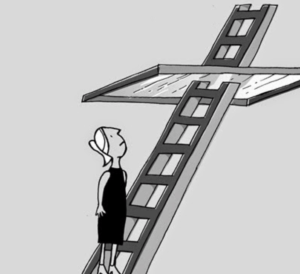(Spoiler alert: no, merit is not enough).
In 1975, in a country of which we have almost no record except for those who yearn for the Northern Lights and the music of Björk, women held a 24-hour strike. It was a Friday. What did they want? (It's a good question; we grew up hearing that it's incredibly difficult to know what we want...). The demands were clear:
- More women in decision-making spaces (parliament, local councils, etc.).
- Eliminating the pay gap: earning the same as men for the same job.
- Concrete measures to equalize the burden of care work.
To everyone's "surprise" (sarcastic smiles here), the country came to a standstill: not only were there no women in their jobs in companies, but there was also no one to take care of the house and the children.
In response, the "Equal Rights for Men and Women Act" was passed in 1976. Today, Iceland is the most equal country in the world.
The beginning was mandatory quotas in the public sector: government agencies, the judiciary, etc. Today, they are also mandatory in the private sector.
We're traveling and coming back here. Argentina 2018. Some facts:
- Women work an average of 4 additional hours a day on care tasks.
- Women make up 7 out of 10 people living in poverty.
- The wage gap varies between 27 and 35% and increases as we move up the corporate hierarchy.
- We occupy less than 10% of the management positions in the country's large and medium-sized companies, public institutions, business chambers, namely
The 0% of the UIA Executive Committee
The 4% of the SRA board of directors
The 4% of CEOs of large companies
The 71st Session of the Business Chamber Presidents' Meeting
The 20% of the general secretaries of trade unions
The 10% of the nation's ministers (previous ministerial scheme to the current one)
The 34% of the national deputies
The 17% of the governors
Meritocracy (countless ellipses here)
Those who oppose affirmative action measures, those measures that force equality (i.e., since we can't get it, we have to push), often argue that if there aren't more women, it's because we're not interested in those positions; that the best always get them, regardless of gender (HA!), and that whoever wants it, gets it. They cite the few we know as examples. But, as the popular saying goes: one swallow doesn't make a summer.
And then?
The first thing is to recognize that there are prejudices and also invisible structures (called glass ceilings and walls) that prevent women from accessing positions of power.
The second is that by occupying those spaces, we will ensure that people talk about what affects us: the need for shared leave, care organizations for children, the elderly, or people with disabilities, and economic decisions.
Finally, companies must stop waiting for the state to force them. Incorporating a gender perspective and policies that promote equity and opportunities goes far beyond a modern social responsibility action: it's profitable!
Of course, we must dare to break paradigms, cure blindness, denaturalize.
Finally, a personal anecdote: I received a call from a local company. They had some equity policies in place, but they didn't understand why they weren't achieving much. The most significant one was that, given the need to hire people and, given the same capabilities, women had to be prioritized until the 50% (50%) was reached. Was this fulfilled? Yes! And then? Let me tell you: the 85% (50%) of the managers were men. After the probationary period, they dismissed the women and, miraculously, only men were left. No one, not one of them, ever met the requirements.
What was not working?
I'll leave that for you to think about.
Miscellaneous
- Census question: Do you work? No, I'm a housewife... I recommend watching a short film: What they call love is unpaid work (http://economiafeminita.com/primer-corto-de-economia-feminista/)
- EPH (Permanent Household Survey) category: Young People Ni-Ni (neither working nor studying). However, women in this category work caring for minor relatives or doing housework. Return to point 1.
- If you'd like to read: "Who Cooked Adam Smith's Dinner? A History of Women and the Economy" by Katrine Marcal.
- An American economist, Alice Wu, decided to build a classification algorithm for her final degree project to measure which words best predict whether a comment refers to a man or a woman on a blog called “Economics Jobs Market Rumors.”
He found that:
- The words that best predict whether the post refers to a man are: macroeconomics, supervisor, director, and homosexual (3 professionals, 1 non-professional).
- The ones that best predict a post about a woman are: attractive, married, pregnant, pretty, beautiful, and boobs. Yes: NONE of these refer to professional characteristics.
Sources: indec.gob.ar, @carteleralct, www.cippec.org and www.economiafeminita.com.


Leave a Reply
You must be logged in to post a comment.